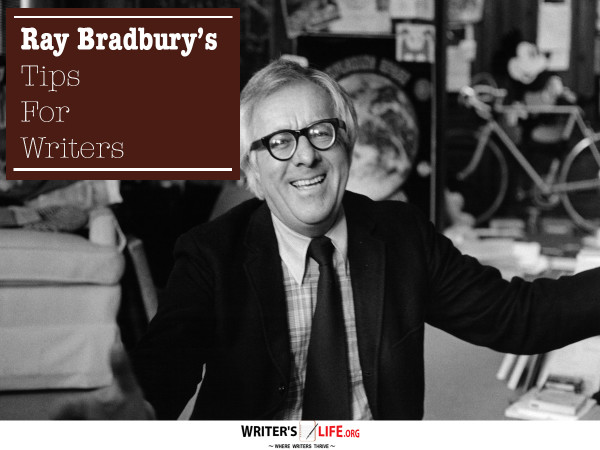- How To Tackle Jealousy In Creative Writing
- Common Submission Mistakes
- How To Stop Your Blog Becoming Boring
- The One Thing Every Successful Writer Has In Common
- How To Make Yourself Aware Of Publishing Scams
- Why Almost ALL Writers Make These Grammar Mistakes At Some Point
- 5 Tips For Authors On How To Deal With Rejection
- Top Mistakes to Avoid When Writing a Novel
- How to Avoid Common New Writer Mistakes
- 10 Mistakes New Fiction Writers Make
Ray Bradbury’s Tips For Writers

Share, Pin or Retweet If You Love Writing!
Like fellow genre icon Stephen King, Ray Bradbury has reached far beyond his established audience by offering writing advice to anyone who puts pen to paper. (Or keys to keyboard; “Use whatever works,” he often says.) In a 2001 keynote address at Point Loma Nazarene University’s Writer’s Symposium By the Sea, Bradbury tells stories from his writing life, all of which offer lessons on how to hone the craft. Most of these have to do with the day-in, day-out practices that make up what he calls “writing hygiene.”
Here at Writers Life we understand this concept and its importance to getting your project done in a timely manner. The Get It Done, Writer's Toolkit. CLICK HERE! This is an affordable and useful ebook / audio CD combo set that teaches writers how to overcome writer's block and procrastination. It also provides tips and resources on how to find more time and inspiration to write and helps you apply some of the great advice that the great science fiction and television writer has offered students in the past.
Here, in list form, is how I interpret Bradbury’s program:
- Don’t start out writing novels. They take too long. Begin your writing life instead by cranking out “a hell of a lot of short stories,” as many as one per week. Take a year to do it; he claims that it simply isn’t possible to write 52 bad short stories in a row. He waited until the age of 30 to write his first novel, Fahrenheit 451. “Worth waiting for, huh?”
- You may love ‘em, but you can’t be ‘em. Bear that in mind when you inevitably attempt, consciously or unconsciously, to imitate your favorite writers, just as he imitated H.G. Wells, Jules Verne, Arthur Conan Doyle, and L. Frank Baum.
- Examine “quality” short stories. He suggests Roald Dahl, Guy de Maupassant, and the lesser-known Nigel Kneale and John Collier. Anything in the New Yorker today doesn’t make his cut, since he finds that their stories have “no metaphor.”
- Stuff your head. To accumulate the intellectual building blocks of these metaphors, he suggests a course of bedtime reading: one short story, one poem (but Pope, Shakespeare, and Frost, not modern “crap”), and one essay. These essays should come from a diversity of fields, including archaeology, zoology, biology, philosophy, politics, and literature. “At the end of a thousand nights,” so he sums it up, “Jesus God, you’ll be full of stuff!”
- Get rid of friends who don’t believe in you. Do they make fun of your writerly ambitions? He suggests calling them up to “fire them” without delay.
- Live in the library. Don’t live in your “goddamn computers.” He may not have gone to college, but his insatiable reading habits allowed him to “graduate from the library” at age 28.
- Fall in love with movies. Preferably old ones.
- Write with joy. In his mind, “writing is not a serious business.” If a story starts to feel like work, scrap it and start one that doesn’t. “I want you to envy me my joy,” he tells his audience.
- Don’t plan on making money. He and his wife, who “took a vow of poverty” to marry him, hit 37 before they could afford a car (and he still never got around to picking up a license).
- List ten things you love, and ten things you hate. Then write about the former, and “kill” the later — also by writing about them. Do the same with your fears.
- Just type any old thing that comes into your head. He recommends “word association” to break down any creative blockages, since “you don’t know what’s in you until you test it.”
- Remember, with writing, what you’re looking for is just one person to come up and tell you, “I love you for what you do.” Or, failing that, you’re looking for someone to come up and tell you, “You’re not nuts like people say.”
When you are ready to self-publish your first novel, you might be interested in "How to Get Published, Sell Books & Attract Tens of Thousands of Readers by Selling Your Content on Amazon’s Kindle” (CLICK HERE), which is a webinar that we put together that teaches writers how to publish to Amazon's Kindle Directory and also market, promote and sell their work.
The advice in this article is by Bradbury. The intro was written by Colin Marshall and is posted under the title Ray Bradbury Gives 12 Pieces of Writing Advice to Young Authors at http://www.openculture.com/2012/04/ray_bradbury_gives_12_pieces_of_writing_advice_to_young_authors_2001.html


























